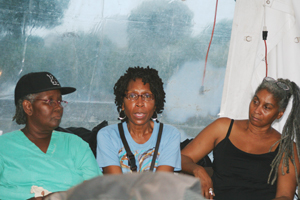
Follow workers.org on



RED HOT: TRAYVON MARTIN
CHINA,
AFGHANISTAN, FIGHTING RACISM, OCCUPY WALL STREET,
PEOPLE'S POWER, SAVE OUR POST OFFICES, WOMEN, AFRICA,
LIBYA, WISCONSIN WORKERS FIGHT BACK, SUPPORT STATE & LOCAL WORKERS,
EGYPT, NORTH AFRICA & MIDDLE EAST,
STOP FBI REPRESSION, RESIST ARIZONA RACISM, NO TO FRACKING, DEFEND PUBLIC EDUCATION, ANTI-WAR,
HEALTH CARE,
CUBA, CLIMATE CHANGE,
JOBS JOBS JOBS,
STOP FORECLOSURES, IRAN,
IRAQ, CAPITALIST CRISIS,
IMMIGRANTS, LGBT, POLITICAL PRISONERS,
KOREA,
HONDURAS, HAITI,
SOCIALISM,
GAZA



|
|
Katrina survivors speak out
By
Ellen Catalinotto
Washington, D.C.
Published Oct 4, 2007 1:38 AM
As part of the week-long Encampment in front of the Capitol building, a lively
political discussion on the current situation for Katrina and Rita survivors as
well as immigrant workers in New Orleans and the Gulf Coast took place Sept.
27.
|
Ivey Parker, Christine Gavin-Lathan
and
Brenda Stokely of the New York
Solidarity
Committee for Katrina/Rita Survivors.
WW photo: Deirdre Griswold
|
The meeting was organized by the Troops Out Now Coalition.
The meeting took place in a large tent and featured Katrina survivors Ivey
Parker and Christine Gavin-Lathan, Brenda Stokely from the New York Solidarity
Committee for Katrina/Rita Survivors, and Teresa Gutierrez from the May 1st
Immigrant Rights Coalition. Monica Moorehead from the International Action
Center chaired the meeting.
A video, “Welcome to New Orleans” directed by Rasmus Helm, was
shown. Filmed in New Orleans in 2005, days after Hurricane Katrina, the film
showed Malik Rahim, co-founder of the New Orleans-based Common Ground
Collective, helping to organize relief and medical care for the survivors and
talking of his history in the Black Panther Party, of being in prison and of
organizing ex-offenders.
The documentary also shows racist white vigilantes, including a firefighter,
brandishing their weapons and using catch phrases such as “We shot
‘em” and “In this neighborhood we take care of our own”
in reference to targeting mainly Black men.
Injustice in Louisiana
Parker, a native of New Orleans now living in New York, spoke on how she had to
wait three months for a doctor’s appointment. Charity, a public hospital,
was closed down although it was not physically damaged by the hurricane. Parker
mentioned how private hospitals are too expensive for the poor, who have no
resources to deal with depression—now rampant there.
Parker commented, “The federal government wants to tear down the
projects. Projects need pools, recreation areas, not to be torn down. People
who own homes get just a fraction of the money needed for repairs. Rents have
gone up. The ‘Road Home’ program is a failure.”
Christine Gavin-Lathan of Gulfport, Miss., who also resides in New York now,
attended the International Tribunal on Katrina and Rita in New Orleans in
August. People came from all over the world to serve as judges and to hear
testimony of people impacted by the disasters. She pointed out how unionized
teachers in New Orleans were replaced with inexperienced, often unlicensed
teachers for charter schools. Lathan said that there should be attention
focused on the devastation that still affects Mississippi.
The need for Black/Brown unity
Brenda Stokely remarked that much of the money that was earmarked for Gulf
Coast reconstruction has been diverted into gambling casinos.
The lower Ninth Ward, where Black people had lived in their own homes for
generations, now looks like a big empty field. While Bush plans to bulldoze
public housing in New Orleans, any new buildings that go up cannot be
constructed with equal quality. Public housing tenants are organizing to save
their homes.
Stokely said that mental health facilities are virtually nonexistent in New
Orleans. There are an estimated 122 psychiatric beds left in the whole
city.
Teresa Gutierrez spoke on her humanitarian trip to New Orleans with activist
Johnnie Stevens right after Hurricane Katrina, in August 2005. They were unable
to deliver water and other supplies to people in New Orleans because the area
was militarily occupied. The police turned them away.
In Houston they saw many broken-down cars on the road and refugees from the
storm searching for loved ones. But on May 1, 2006, a million people marched
for immigrant rights.
Gutierrez stated, “Black and Brown must work together. Let’s raise
Katrina at every immigrant rights event and immigrant rights at every Katrina
event. These struggles and the anti-war struggle must be linked. The Sept. 29
demo welcomes Katrina survivors and immigrants.”
Kali Akuno, a leader of the People’s Hurricane Relief Fund in New
Orleans, attended this meeting and made remarks.
Articles copyright 1995-2012 Workers World.
Verbatim copying and distribution of this entire article is permitted in any medium without royalty provided this notice is preserved.
Workers World, 55 W. 17 St., NY, NY 10011
Email: [email protected]
Subscribe [email protected]
Support independent news DONATE
|
|


